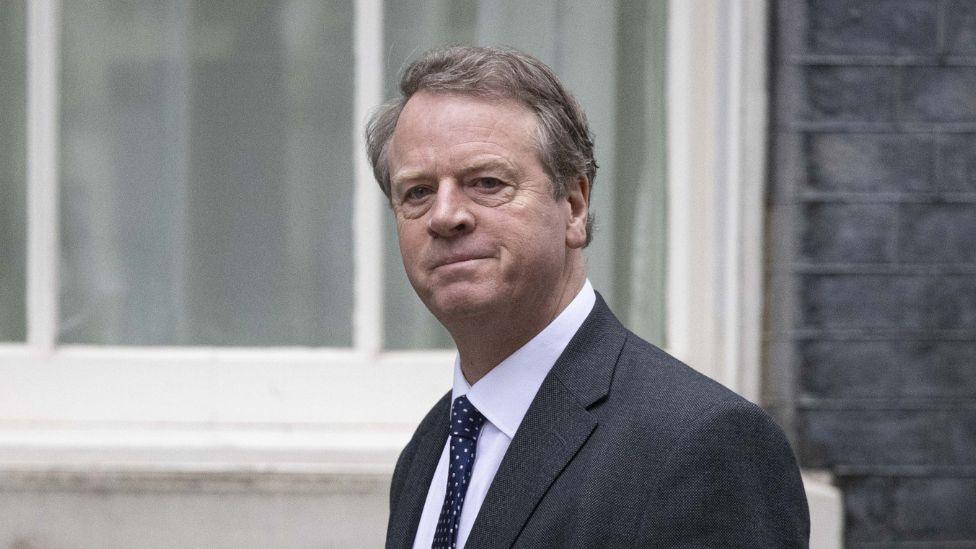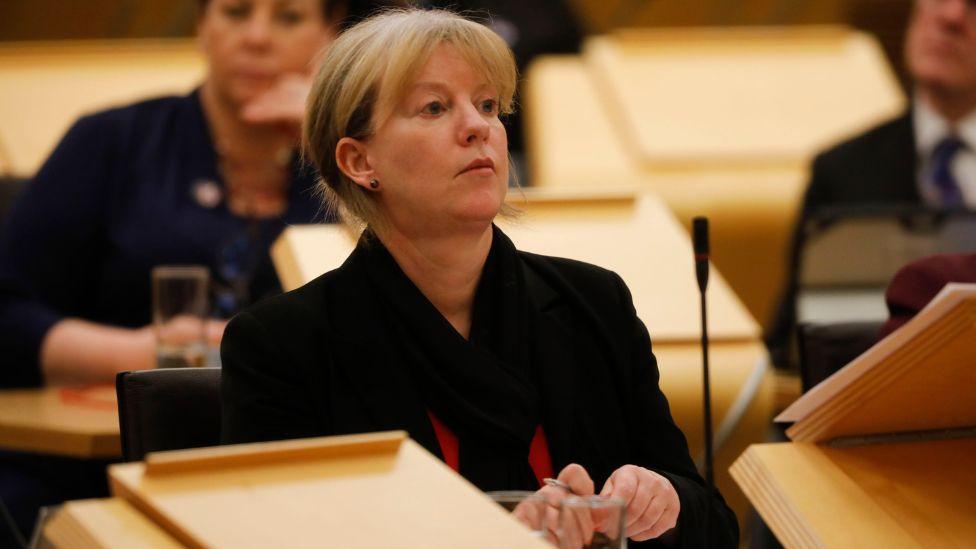Alister Jack urged to 'come clean' on gender law objection
- Published

Scottish Secretary Alister Jack has blocked the gender legislation with a Section 35 order
The Scottish government has called on Westminster to "come clean" over why it blocked the gender recognition bill - or explain how it can be amended.
The Holyrood bill, passed last month, aims to make it easier for people to change their legally recognised sex.
Scottish Secretary Alister Jack claims it will have an adverse impact on British equality laws.
The Scottish government accused No 10 of using the issue as a "political weapon" and threatened legal action.
The UK government is blocking the legislation under what is known as a Section 35 order.
Mr Jack has said having two systems of gender recognition north and south of the border risks creating "significant complications".
The Scottish secretary is able to use a Section 35 to prevent legislation passed by Holyrood from being given royal assent if he believes it would have a detrimental impact on areas reserved to Westminster.
Nicola Sturgeon's government has branded the move "an attack on the democratically elected Scottish parliament". The first minister said the row will "inevitably" end up in court.
On Saturday hundreds of trans rights activists gathered in Glasgow city centre to protest against the UK government's decision.
One of the demonstrators, Anissa Praquim, said the political row was having a detrimental impact on the trans community.
"It's undignified. The whole point of this law being passed was to allow trans people a bit of dignity and a bit more humanity when they're trying to be legally recognised."

Anissa Praquim believes the political row is "undignified"
In a letter to Mr Jack, Scotland's social justice secretary highlighted previous UK government comments stating Holyrood could have its own gender recognition rules.
Shona Robison said this contradicted Mr Jack's opposition to a distinct Scottish system, and called on him to detail how the legislation could be changed to meet Westminster's demands.
She said the Section 35 order "demonstrates complete disregard for devolution" and urged Mr Jack to immediately revoke the order to allow for talks to resolve any issues the UK government has with the bill.
The SNP minister wrote: "Your letter provided scant detail on the reasons for the order, and like everyone else we had to wait until publication late on Tuesday afternoon of your policy statement to see any substantive explanation.
"We will respond in full to the points raised in the appropriate forum which, given the approach taken by the UK government, is now likely to be through the courts."
Ms Robison went on to challenge apparent contradictions in the Mr Jack's case.
"You have said that you hope we can work together to find a constructive way forward which respects devolution and the operation of UK legislation," she wrote.
"This seems utterly incompatible with your approach of waiting until after the bill has been passed to implement a power of veto never used before, with no warning communicated about the use of that power or prior attempt to engage on the detailed issues now raised.
"Please would you clarify how the Scottish government can work constructively with you under these circumstances."

Scottish culture secretary Shona Robison has challenged the UK government to explain its decision
Scotland's social justice secretary also expressed disappointment that Mr Jack would not appear in front of Holyrood's equalities committee to explain the Section 35 order.
She continued: "You have said that you are open to consideration of an amended bill, yet the reasoning you have set out includes a fundamental objection to the existence of two different systems within the UK."
She said this was in "direct contradiction" of the UK government's position as set out in its 2018 consultation on gender recognition reform, which stated a commitment to "mutual recognition of certificates issued in different parts of the UK across the UK".
The UK government has published a statement of reasons, external alongside the Section 35 order which it says sets out in full the adverse effects it is concerned about.
A UK government spokesperson said the Scottish secretary would respond to Ms Robison's letter in due course.
They said the section 35 order was made after "thorough and careful consideration of all the relevant advice and policy implications".
"This was done after thorough and careful consideration of all the relevant advice and the policy implications. This legislation would have an adverse impact on the operation of Great Britain-wide equalities legislation," they added.
"Transgender people deserve our respect, support and understanding. Our decision is about the legislation's consequences for the operation of GB-wide equalities protections and other reserved matters."